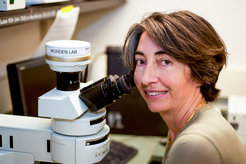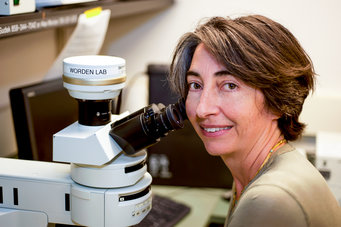Researcher from Schleswig-Holstein becomes member of Leopoldina
Professor Alexandra Zoe Worden honored for her scientific achievements in the field of ecology and biology of ocean ecosystems with membership in the academy
Kiel / Plön. The German Academy of Sciences Leopoldina elected Alexandra Zoe Worden, Professor of the Biology of Oceanic Ecosystems at GEOMAR Helmholtz Centre for Ocean Research Kiel and Kiel University, as well as Max Planck Fellow at the Max Planck Institute for Evolutionary Biology in Plön, as a new member in May. The membership certificate will be conferred in a formal ceremony in April 2023. The Leopoldina represents German research abroad. With around 1,600 members from more than 30 countries, it is the largest science academy in Germany and combines expertise from almost all research areas.

She is a professor of ecology at GEOMAR Helmholtz Centre for Ocean Research Kiel and at Kiel University. She is also a Max Planck Fellow at the Max Planck Institute for Evolutionary Biology in Plön. Photo: Todd Walsh/MBARI
Professor Alexandra Zoe Worden's cutting-edge research in the field of evolutionary biology was recently recognized with a membership in the National Academy of Sciences Leopoldina. Worden is a professor of ecology at GEOMAR Helmholtz Centre for Ocean Research Kiel and at Kiel University. Since May 2021, she has also been a Max Planck Fellow at the Max Planck Institute for Evolutionary Biology in Plön. The Leopoldina unites researchers with special expertise in their respective fields. Criteria for admission are outstanding scientific achievements.
“The issues facing our planet – and our own existence – are entwined with ocean health. As scientists we have a tremendous responsibility to understand and communicate how both ocean food chains and carbon dioxide uptake from the atmosphere function, and how we can best protect that functionality,” says Worden. “In addition to innovative science and international collaborative efforts that extend beyond geopolitical boundaries, another key piece in protecting this functionality is to have authenticity with the human communities we seek to support. So, a second layer here is to engage with local communities around the globe and understand the needs of different groups and cultures. This can be accomplished most effectively by expanding the diversity of individuals within the sciences, so that communities of different backgrounds and with differing local issues can identify with and connect to scientific and regulatory leaders. I am both honored and tremendously excited to contribute to the efforts of Leopoldina to provide guidance and initiatives on the scientific and societal issues that confront humanity today.”
Worden is known for her highly interdisciplinary research, in which she integrates genomic approaches, oceanography, ocean technology and evolutionary biology. She is considered a pioneer in understanding of a key group of photosynthetic organisms and their contributions to the uptake of carbon dioxide in marine ecosystems, tiny algae now known as picoeukaryotes. More broadly she continues to study interactions between microbes, and consequences for CO2 fixation and export to the deep sea.
Professor Dr. Katja Matthes, director of GEOMAR, adds: "GEOMAR warmly congratulates Alexandra Worden on her membership. With her, the Leopoldina gains a top-class scientist for its ranks. It is this kind of cutting-edge research that is now needed to develop solutions to current challenges."
The election takes place in the midst of the UN Ocean Decade 2021-2030. “Professor Worden’s membership underlines outstanding expertise in marine sciences, also based on strong cooperations in Kiel and the region”, emphasizes Professor Dr. Simone Fulda, President of Kiel University. “It strengthens the importance of our interdisciplinary priority research area Kiel Marine Science at Kiel University and draws increased attention to the important role of the ocean in times of global change.”
"Also on behalf of our Institute, I would like to extend our congratulations to Professor Dr. Worden on this great and well-deserved achievement," says Professor Dr. Paul Rainey, Executive Director at the Max Planck Institute for Evolutionary Biology in Plön. Here, Alexandra Worden leads an associated research group as a Max Planck Fellow where they work to elucidate the molecular mechanisms behind photosynthetic productivity and how algae will transition in future climate scenarios.
In addition to Worden's research leading to the discovery of new photosynthetic groups in the ocean, insights into the evolution of uncultured algae, and interactions between uncultured biological entities she has served on multiple commissions and co-authored guiding scientific documents and major perspective pieces. She is a recognized proponent of diversity and equity in science. At the conceptual level, Professor Worden has emphasized the need to integrate biological and physical scales, as well as evolutionary and computational approaches, to develop effective global biogeochemical models.
